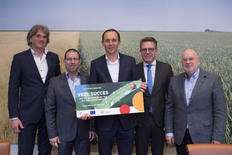- The demonstration plant will produce 10 tons of plant-based MEG annually.
- The plant's construction is supported by a €2 million grant from the European Regional Development Fund.
- Opening is scheduled for the second half of 2019.
- The plant will be located near Avantium's Dawn Technology™ pilot biorefinery.

Plant Location and Capacity
Avantium has chosen Chemie Park Delfzijl in the Netherlands for its new demonstration plant for the Mekong technology. The plant will have a capacity of around 10 tons of plant-based mono-ethylene glycol (MEG) annually.
Construction Timeline
The construction of the demonstration plant is on track, with the opening scheduled for the second half of 2019. This marks a significant step in the commercialization of plant-based MEG, a sustainable alternative to fossil-based raw materials used in plastics and textiles.
Technology and Market
Mekong technology by Avantium uses renewable carbon sources to produce MEG in a single-step process from industrial sugars. Currently, over 99% of MEG is derived from fossil-based materials, with a market value of approximately $25 billion. The goal is to produce plant-based MEG that is chemically identical and cost-competitive with its fossil-based counterpart.
Funding and Support
The decision to build the plant in Delfzijl was influenced by a €2 million grant from the European Regional Development Fund, facilitated by Partnership Northern Netherlands. This grant aims to accelerate innovation towards a low-carbon economy.
Strategic Location
The Mekong demonstration plant will be situated near Avantium’s Dawn Technology™ pilot biorefinery, which produces glucose and lignin from non-food biomass. This strategic location supports the development and scaling up of Avantium’s renewable chemistry technologies.
Regional Impact
Patrick Brouns, regional minister of Groningen, expressed satisfaction with Avantium's choice of location, highlighting the innovation and skilled jobs it brings to the region. The aim is to develop Chemie Park Delfzijl into one of Europe’s most sustainable chemical clusters by 2030.

